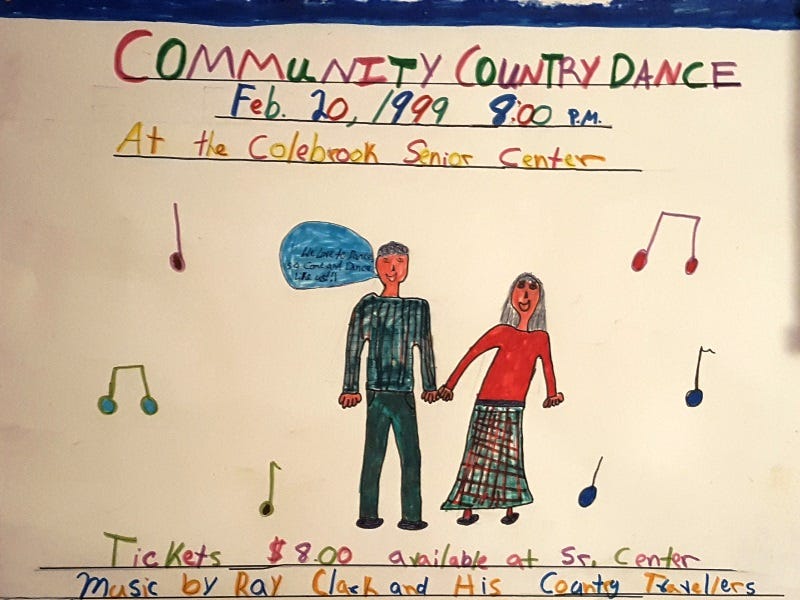Can We Find Real Community Online?
A New York Times event raised more questions than it answered.
Yesterday the New York Times held an event called “Can We Find Real Community Online?” for subscribers only, at no charge. It was a research exercise for them, and turned out to be a good research venture for me, too, because a day in advance they set up a Slack channel. They assigned a journalist named Jim Colgan to kickstart discussion with occasional questions.
I decided to add questions of my own, and I learned a couple of things.
First, as you know, there are certain behaviors online that would simply never happen in real life. The man who immediately asked if I was the UC Berkeley Karen Christensen, with a nice message about how he thought we’d met in the Yucatan, disappeared after I responded. In real life, we’d have laughed about it and then talked for a minute.
More important was the vast difference between my take on the subject and that of the New York Times.
The program’s title was “Can We Find Real Community Online?” When I ask that question, I’m thinking about what makes “real community” and about the quality of relationships online, compared to relationships sustained face to face.
This matters because a sense of community is a vital component of human happiness.
A sense of community increases our well-being, physically and mentally, and even helps us live longer. It even helps us make better life choices and spend less. I wanted to drill into that and find out what makes online relationships different, and how they might be enriched and deepened.
But the speakers, as well as the tech professionals, were thinking about trolls and threats and online mayhem. When the live-stream program started, the Times technology writer Shira Ovide began by saying that there were two widely accepted rules for creating a successful community online: lots of rules and lots of moderation.
That is policing, not community building.
But that seems to be the main thing people were concerned about, along with creating business models and revenue streams.
Admittedly, real-life communities and third places often have unofficial moderators. Bartenders and old-timers take this role. But what moderates a group in real life is often just the group itself. If someone starts to get out of line - voice getting louder, not letting anyone else talk - there’s a ripple through the crowd, subtle movements, eye contact, and the problem person is often brought down to earth without a single word being said.
There was also quite a bit on Slack about using AI to moderate online conversations. I found that creepy, having just been reading about the disappearance of a Chinese tennis star after she posted on Weibo that she’d been sexually abused by a senior member of the country’s leadership. That her post could have been found and deleted as quickly as it was (within minutes, according to reports) means they are using AI to look for leaders’ names in real time. All I could think, as I read the Slack messages about how great it will be when AI can monitor conversations to remove “toxic” content, was how easily that technology could be abused.
Is it possible, you might wonder, to assess the quality of relationships? I did a search and found articles about testing the quality of a marriage, and also a lot about measuring children’s friendships. I did not find anything on the issue I had in mind: the effect of knowing someone for a long time, of having common friends, of having shared experiences (going to school together can create strong bonds, and going to summer camp together seems to be even more of a relationship cement), and simply having biographical information. If you know of research on this, please do let me know.
Sure, while on Slack I was able to look up one of the people I was chatting to. But that’s not the kind of biographical information you get from normal face-to-face conversation. Think of the common gambit when you first meet someone, that search for mutual friends or some common experience that often starts a cocktail or dinner party conversation. Think of the things you pick up about workmates or neighbors just from being around them, seeing who’s coming and going, whether they are bright in the morning or desperately sucking down coffee, whether they seem to be on the go all the time or taking a lot of leisurely walks.
Don’t get me wrong: friendships and community are not only face-to-face. My closest friends are far away, and I’ve had some very important friendships with people I’ve never met. And there’s Ray Oldenberg, whom I corresponded with for nearly 20 years before we met.
But it was important that we meet, and spend time together. One of the chapters I have to write for the new edition of The Great Good Place will be asking the question the New York Times asked yesterday. I intend to have an answer that deals with more than policing bad behavior.
An interesting detail from the Slack conversation, by the way, is that people wanted to limit their children’s screen time, but said they had given up trying to limit their own. That surprised me. I thought we were all tired of Zoom and racing for the nearest restaurant or picnic or parade.
An event run by tech people attracts the screen evangelists, of course. They seemed very nice, from the brief exchanges we had. I still know nothing about them. In fact, I tried dropping details about my interests into the chat, which did stimulate conversation. But the only information anyone else revealed was their professional position or a pitch for their start-up.
I’ll keep trying. Folks like that are clearly interested in talking about these issues and it helps me to hear different perspectives. There is only one thing that’s ever stopped me cold in an online community gathering: “ice breakers.”
I loathe ice breakers. But there is one that fits with the idea that to develop any kind of relationship you need to learn something meaningful about the other person. I saw this work well at a dinner party at my house, when I had invited a dozen people who didn’t know one another (a few were visiting, and the others were scattered local acquaintances). Someone said, “Let’s go around the table and tell everybody about your hometown.”
It was a great way to learn something different about my friends, and it taught me a lesson about myself: I really didn’t have an answer. I don’t have a hometown. And maybe that’s why I find community so endlessly fascinating.
The ironical twist is that my question about the quality of online relationships provoked more replies than all the other posts put together.
I’d love to hear what you think.
Warm regards, Karen.









Many sites and services present themselves as places to keep up with old friends or to find people one can meet later on, sometimes in groups ranging from cat lovers to White Militia. A substitute for face-to-face contacts, they do not try to be.
But allow me to digress to remote communities and concentrate on those in the north. Nordic countries, Inuit, Siberian, whatever, the percentage of wired households is generally very high.
Before, they were necessarily close knit, with all its rewards, but also their share of rancor (Not all trolls are online or under bridges). What happens to all that when the Internet and social media arrive? There are anthropologists of the Internet, but not many address this basic question.
Iceland is very wired. Second-hand information is that time online is not excessive and old community channels largely survive.
What happens in the high arctic, where for many months the cold discourages leaving the house? In the far north of Canada the CBC has long maintained local radio stations. https://en.wikipedia.org/wiki/List_of_radio_stations_in_Nunavut
Note the format: “public, talk.” A Canadian archaeologist working in Resolute once elaborated to me. The chitchat ranges from gossip to advice, but much is mundane, e.g., someone dropped by for tea and biscuits. I read that people in Resolute have complained about slow access speeds, so interest in the Net is strong. Still, the radio station goes on.
As a regular reader of the NYT daily paper since the 1970s, I often choose to send quick thoughts to the comment section of the "online" version of NYT news stories. which generally appear the next day in the "hardcopy" NYT.
I suspect the online NYT has more "community" readers than the hardcopy NYT, although I don't know the actual #$s, but I sense there's more sense of community in the online version which allows immediate thoughtful comments from readers.
So, sharing and reading "others" views of NYT news stories or opinions pieces generally creates a greater sense of shared community with online opportunities.
In my opinion, the Washington Post reader comments sections seem more alienating, probably because the format has been changed recently and it's difficult to follow intelligent string conversations.
Recently, I noticed the WAPO comments are cruel or condescending put-downs, on both sides of the political issues, as can be expected, since 2016, especially.
Years ago, in the mid 1970s, I tried the "Community" friendship card with some Chinese ambassadors in Wash DC along with some Americans from the National Committee on United States China Relations (NCUSCR), but still, even then, the "Taiwan issue" dislodged any further agreement of hope for continued community. That's almost 50 years ago.
So, since most online communities provide anonymous feedback in most instances, since the actual name of the commenter is rarely used - I think stronger community is being degraded before our eyes.
Even "in person" conversations require a "decoding." Can that be because there is too much info to be digested, and, we are being driven further apart because FEAR and MISTRUST has been weaponized by a small segment of our declining culture.